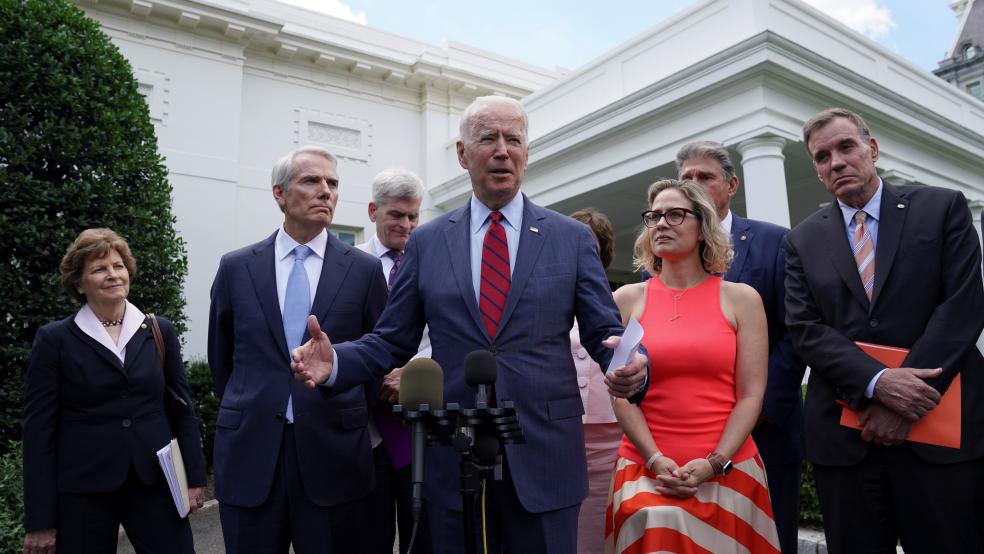President Joe Biden and a bipartisan group of 10 centrist senators announced Thursday that they had reached an agreement on a long-sought package to invest hundreds of billions of dollars in the nation’s transportation, water and broadband infrastructure.
“We have a deal,” Biden told reporters at the White House after meeting with the senators midday. “We’ve all agreed that none of us got what we all would have wanted. I clearly didn’t get all I wanted. They gave more than I think they were maybe inclined to give in the first place.”
The agreement calls for $973 billion in spending over five years, or $1.2 trillion if extended to eight years, according to the White House. That includes $579 billion in new spending, with $312 billion for transportation projects, $55 billion for water infrastructure and $65 billion for broadband.
“Today is a huge day for one half of my economic agenda, the American Jobs Plan,” Biden later said, adding that the agreement would provide two-thirds of the physical infrastructure spending he called for in his proposal.
Democrats want a two-part package: Biden and Democratic congressional leaders insisted that the bipartisan deal on physical infrastructure would only be enacted alongside a broader spending package focused on child care, elder care and education, areas the administration has termed “human infrastructure.” Democrats are preparing to push through those parts of the president’s agenda via a process called budget reconciliation, which would allow them to bypass the need for Republican support.
“For me, investment in our physical and human infrastructure are inextricably intertwined,” Biden said. He added that he will not sign the bipartisan deal without the broader bill. “If this is the only thing that comes to me, I’m not signing it. It’s in tandem,” he said. “I’m not just signing the bipartisan bill and forgetting about the rest that I proposed.”
Similarly, House Speaker Nancy Pelosi said that the House would not take up the bipartisan deal until the Senate approves the reconciliation package. “I said there won’t be an infrastructure bill unless we have a reconciliation bill, plain and simple,” Pelosi said.
The reconciliation package would require the support of all 50 Senate Democrats. Sen. Joe Manchin said Thursday he was open to helping craft the bill but would not commit to supporting it before seeing the details. He said he is concerned about the potential costs and how they would be paid for or whether they would add to the national debt. “We have to see what’s in the other plan before I can say, ‘Oh yes, you vote for this, I’ll vote for that,” Sen. Joe Manchin (D-WV), told reporters. “That’s not what I have signed up for.”
A long road ahead: “There’s plenty of work ahead to bring this home,” Biden acknowledged Thursday.
The bipartisan deal will need the support of at least 60 senators, and Democrats’ two-track strategy faces challenges in both the Senate and the House, where Pelosi leads a narrow and divided majority.
The Senate deal already faces pushback from some on the left who say it is too small and excludes key priorities on social programs, health care and climate change. The bipartisan deal includes $73 billion for the electric grid and clean energy, for example, far short of what some on the left say is needed. Sen. Richard Blumenthal (D-CT) called the deal “way too small. Paltry. Pathetic.” He added that he needs “a clear, iron-clad assurance that there will be a really adequate, robust package.”
But Biden threw his full support behind the agreement even as he acknowledged that some members of his own party wouldn’t be satisfied with the details. He’s betting that progressives will back him and his deal. “My party is divided, but my party is also rational,” he said. “If they can’t get every single thing they want but all that they have in the bill before them is good, are they going to vote no? I don’t think so.”
Sen. Bernie Sanders (I-VT), who is developing the reconciliation bill as chair of the Senate Budget Committee, had floated a package of as much as $6 trillion, but said he’s prepared to reduce the size of that bill to avoid overlap with the bipartisan deal and secure the needed Democratic votes. "If the bipartisan bill is passed, we're certainly not going to build the same bridge twice, so we can deduct some of what they have passed from the reconciliation," Sanders told reporters.
Still, the two-track Democratic strategy could also risk losing some votes for the bipartisan deal from Republicans who object to the larger package. Republicans may have other concerns about the agreement, as well, including its reliance on stepped-up enforcement by the Internal Revenue Service, a key element of its proposed financing.
A significance beyond roads, bridges and broadband: Biden campaigned on his ability to bridge partisan divides, and he continued to pursue bipartisan talks despite calls from progressives to press ahead with a larger package relying only on Democratic votes. On Thursday, the president touted the importance of bipartisanship, describing the deal as a key step in a race with China — and a critical signal that democracies can compete with autocratic nations in the 21st century.
“We have to move and we have to move fast. This agreement signals to the world that we can function, deliver and do significant things,” Biden said. “Let me be clear. Neither side got everything they wanted in this deal. That’s what it means to compromise. And it reflects something important — it reflects consensus. The heart of democracy requires consensus.”
Budget
Deal! Biden, Senators Agree on $1 Trillion Infrastructure Package

KEVIN LAMARQUE/REUTERS




